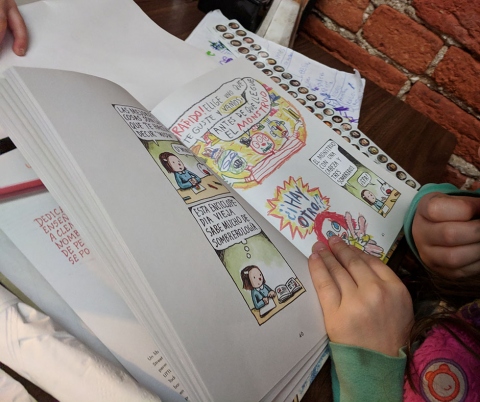Celebrating Latinx Culture with a Spanish Reading Program (2022-2023)
Latinx children growing up in the U.S. often struggle with defining their own identity while navigating values and expectations of two different cultures. Given the lack of prestige and rejection of their language and culture by the dominant community, many Latinx students internalize feelings of linguistic and cultural inferiority during the early stages of reading and speaking in English.
This sometimes leaves Spanish relegated to a second-class status used only in familial contexts, commonly leading to the loss of Spanish. Among the consequences related to the loss of Spanish are poor self-image and cultural identity, eroding family relationships, compromised school relationships and lower school performance.
Building on the work of the 2021-2022 team, this project team supported Latinx children’s pride in their languages and cultures through ¡Celebra Latinx!, a Spanish reading program. This program engages and connects Spanish-language users, namely Latinx children in Durham and undergraduate students, as “peer tutors” and supports them as they create spaces of belonging where speaking and reading together in Spanish builds community.
The team also employed participatory action research methods to explore the experiences of the participants in ¡Celebra Latinx! using interviews and direct measurements. They met with families before beginning sessions to gain an understanding of each family’s strengths and needs (e.g., literacy levels, reading habits and motivation, cultural identity). They then conducted post-participation interviews and compared the same aspects before and after the intervention.
Timing
Summer 2022 – Spring 2023
Team Outputs
¡Celebra Latinx! (2023 Fortin Foundation Bass Connections Virtual Showcase)
Impact of a Reading Program on Latinx Children's Motivation to Read in Spanish and Cultural Identity Formation (poster by Laura Andrade, Joan Clifford, Stephanie Contreras, Phoebe Ducote, Bella Echols, Abigail Eun, Melody Gao, Mauricio Hernandez, Mia Murphy, Aisha Ovando Fernandez, Calista Ringas, Riley Selig-Addiss and Silvia Serrano, presented at Fortin Foundation Bass Connections Showcase, Duke University, April 19, 2023)
Reflection
This Team in the News
Meet the Members of the 2022-2023 Student Advisory Council
Bass Connections Teams Share Research Highlights at 2023 Showcase
See related teams, Celebra mi herencia: A Spanish Reading Program (2023-2024) and Celebrating Latinx Culture with a Spanish Reading Program (2021-2022).
Image: By S. Davis, licensed under CC BY-NC-ND 2.0

Team Leaders
- Laura Andrade
- Joan Clifford, Arts & Sciences-Romance Studies
- Stephanie Contreras, Arts & Sciences-Romance Studies
- Silvia Serrano, Arts & Sciences-Romance Studies
- Maia Szulik, Center for Child and Family Policy, Sanford School of Public Policy
/graduate Team Members
-
Riley Selig-Addiss, Masters of Public Policy
-
Ofelia Lopez, Romance Studies-PHD, Romance Studies-AM
-
Mauricio Hernandez, Environment-PHD
-
Veronica Cora-Castillo, Romance Studies-PHD
/undergraduate Team Members
-
Aisha Baiocchi, Robertson Scholarship - UNC
-
Calista Ringas, Psychology (BS)
-
Aisha Ovando Fernandez, Neuroscience (BS)
-
Mia Murphy, Romance Studies (AB)
-
Kathryn Lewis, Public Policy Studies (AB)
-
Melody Gao, History (AB)
-
Abigail Eun, Public Policy Studies (AB)
-
Bella Echols, Sociology (AB)
-
Kamdon Early, History (AB)
-
Phoebe Ducote, Public Policy Studies (AB)
/yfaculty/staff Team Members
-
Jessica Sperling Smokoski, Social Science Research Institute
-
Katie Rosanbalm, Sanford School of Public Policy-Center for Child and Family Policy
-
Megan Gray, Social Science Research Institute
-
Robert Carr, Sanford School of Public Policy-Center for Child and Family Policy
-
Marie Chelini, Arts & Sciences-Evolutionary Anthropology
/zcommunity Team Members
-
Book Harvest
-
Carlos Taboada
-
Nicolas Andrade, University of Mar del Plata, Argentina
-
Leigh Bordley, Latino Educational Achievement Partnership
-
Celeste Luna, Latinx Arts Boston
-
Iglesia Presbiteriana Emanuel
-
First Book
-
Scholastic
-
Durham Public Library
-
Immaculate Conception Catholic Church
-
Lakewood Elementary
